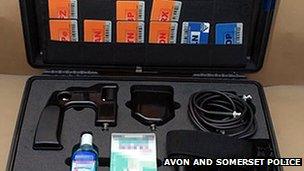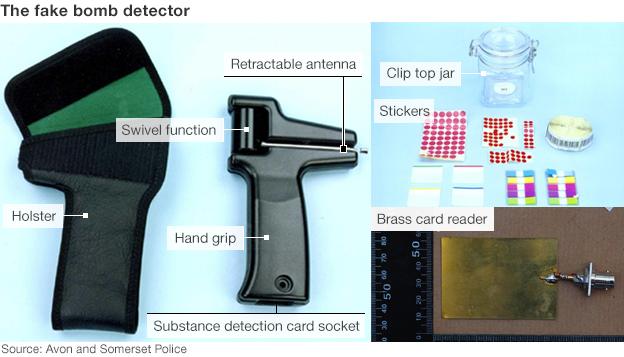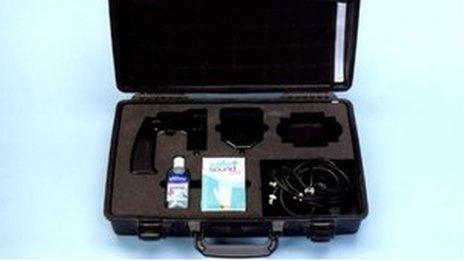Fake bomb detector seller James McCormick jailed
- Published
Det Spt Nigel Rock told the BBC's Daniela Relph: "McCormick is a practised conman"
Fraudster James McCormick has been jailed for 10 years for selling fake bomb detectors.
McCormick, 57, of Langport, Somerset perpetrated a "callous confidence trick", said the Old Bailey judge.
He is thought to have made £50m from sales of more than 7,000 of the fake devices to countries, including Iraq.
The fraud "promoted a false sense of security" and contributed to death and injury, the judge said. He also described the profit as "outrageous".
Police earlier said the ADE-651 devices, modelled on a novelty golf ball finder, are still in use at some checkpoints.
Sentencing McCormick, Judge Richard Hone said: "You are the driving force and sole director behind [the fraud]."
He added: "The device was useless, the profit outrageous, and your culpability as a fraudster has to be considered to be of the highest order."
One invoice showed sales of £38m over three years to Iraq, the judge said.
The bogus devices were also sold in other countries, including Georgia, Romania, Niger, Thailand and Saudi Arabia.
Truck bombs
Prosecuting QC Richard Whittam said the justice and foreign affairs ministries in Baghdad were hit by truck bombs - which drove through the checkpoints where the useless devices were operated.

The device was based on a golf ball finder
The prosecution said the "inescapable conclusion" was that Iraqis died because of their use.
Defence QC Jonathan Laidlaw said other devices had also been used at checkpoints and there was no proof that his client's had cost lives.
"We would need real evidence that a bomb detonated in the green zone (of Baghdad) had failed to be detected by the ADE, to meet a criminal standard of proof," he said.
Detective Superintendent Nigel Rock, of Avon and Somerset Police, said that soldiers, police, border guards, and hotel security staff had all trusted the devices.
Reiterating the judge's comments from inside court, Mr Rock said: "McCormick's profits were obscene, and fed his greedy and extravagant lifestyle.
"And finally, and perhaps most importantly, he has shown no shame, he has shown no remorse, and he carried on with complete cavalier disregard for the consequences of his con-trick."
He said the next stage was to ensure that the "extravagant lifestyle is taken away" from McCormick, saying Iraqi authorities will now be "pursuing compensation through the civil court process in this country".
During the trial, the court was told the detectors, which cost up to $40,000 (£27,000) each, were completely ineffectual and lacked any grounding in science.
McCormick bought novelty "golf ball detectors" which were little more than radio aerials from the US for less than $20 each, before selling them as bomb detectors for $5,000 each.
He then made a more advanced-looking version which he was to sell for for tens of thousands of dollars each. Police say the only genuine part of the kit - and the most expensive - was the carrying case.
McCormick had claimed the devices could bypass "all forms of concealment", detecting drugs and people, as well as explosives, the court had heard.
He said in court that he "never had any negative results from customers".
BBC Two's Newsnight programme conducted an investigation into the devices sold by McCormick's company, resulting in a UK government ban on their sale in Iraq and Afghanistan in January 2010.
A whistleblower told the programme he had confronted McCormick, saying he did not want to be any part of the business if the devices did not work.
McCormick is said to have responded: "It does exactly what it's designed to. It makes money."

How the device was meant to work:
1. A small amount of the substance the user wished to detect - such as explosives - was put in a Kilner jar along with a sticker that was intended to absorb the "vapours" of the substance
2. The sticker was then placed on a credit-card sized card, which was read by a card reader and inserted into the device
3. The user would then hold the device, which had no working electronics, and the swivelling antenna was meant to indicate the location of the sought substance

- Published23 April 2013

- Published2 May 2013
